The week in social: Yo store, Origami, and Twitter on WordPress
#TheDress takes over social media
On Thursday of last week, conversation erupted around a filtered photo posted to Tumblr of a two-colored dress. The photo went viral and turned into a massive meme, as users tried to decipher whether the photo was white and gold, or blue and black. Several hashtags were in use, including #TheDress, #WhiteAndGold, and #BlackAndBlue. As of the end of last week, there were over 4 million conversations taking place in over 100 different countries, with social posts coming from celebrities, and articles being posted on popular sites such as BuzzFeed. While conversation surrounding the dress has slowed down over the weekend, the subject experienced a meteoric rise that very few memes have seen to date.

Reddit takes a stance on adult content
Approximately half a year after nude celebrity photo leaks online, Reddit has updated its digital privacy guidelines clearly stating that explicit photos cannot be uploaded without the individual express consent. The updates to the policy were made on Tuesday, and will go in effect on March 10th. Reddit was considered the main source of the nude celebrity photo leak, and many users are airing grievance that it has taken the company this long to come up with stronger privacy protection for users. The CEO at the time, Yishan Wong, resigned from the company shortly after the fiasco and was replaced with an interim CEO. Reddit currently features a user-base of approximately 200 million.
Read more on Mashable.
LinkedIn pays users due to lost passwords
LinkedIn Premium members who have had their passwords leaked will be receiving a $1 dollar payment as a result of a legal settlement where the professional social network will be paying $1.25 million dollars to users to rectify the leak. Passwords were “hashed”, but not “salted”, meaning that it was relatively easy for hackers to decrypt the passwords once they were stolen, a common, but costly mistake for services that store a user’s personal information. All passwords will be hashed and salted moving forward, and LinkedIn has issued a statement saying noting that it “continues to deny that it committed, or threatened, or attempted to commit any wrongful act or violation of law or duty alleged in the Action.”
More information on The Next Web.
25% of Twitter users retweet celebrities
It’s no secret that the content celebrities put out on Twitter is extremely popular, but a new study done by GlobalWebIndex shows that one in four active Twitter users retweets celebrity content. In addition, 31% of fans of celebrities on Twitter have retweeted their content. The same size for the study was based on Twitter users aged 16-64. Additional statistics include that 26% of users have visited a celebrity’s feed before, and that 21% have tweeted about a TV show while watching, a nod to the second screen experiences that are now common among smartphone and mobile device users.
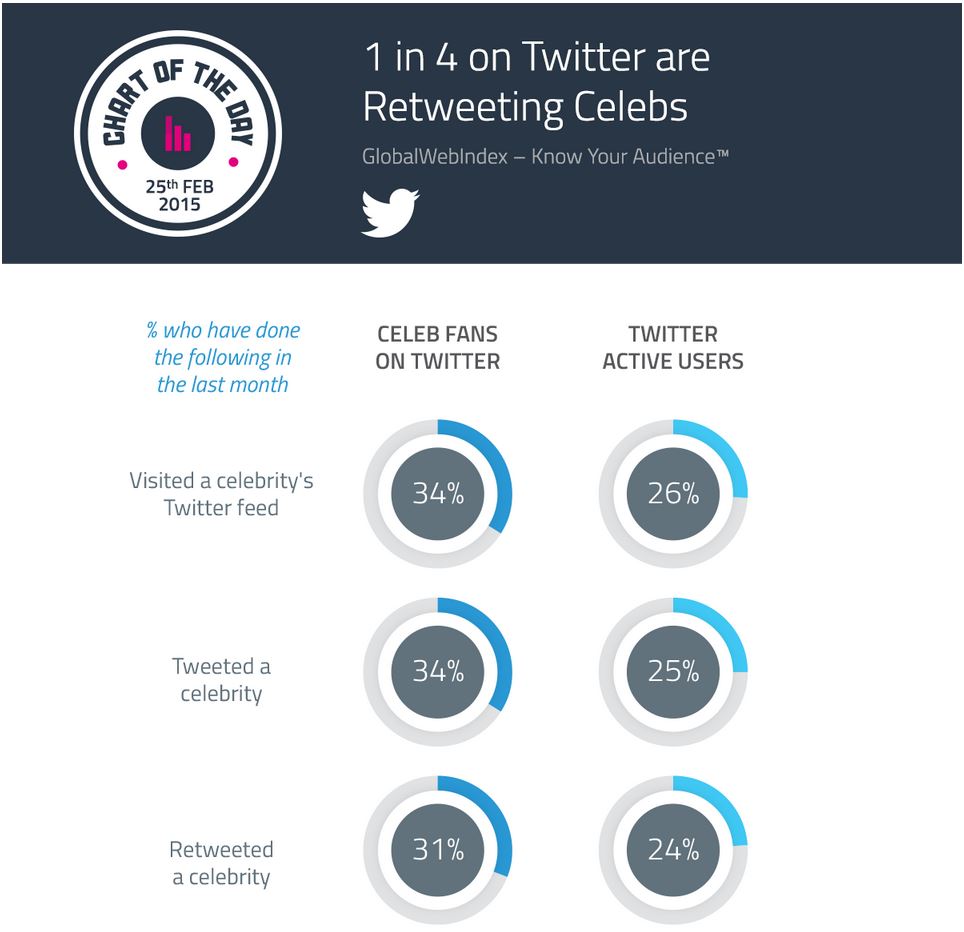
Read more on Social Times.
Yo updates app to feature real time content updates
Yo was an app intended to show the eventual path of single-use applications, and more just to be plain fun, allowing users only to send each other the word “yo”, without any additional context. New updates this week however, will let users receive photo and link updates from approximately 150 news and information sources. Wrapped up in the form of a Yo store, users can choose what feeds they subscribe to, and sources include Buzzfeed, NBA, and more. At its peak, Yo had 3.5 million users, and during this past summer raised $1.5 million in funding.
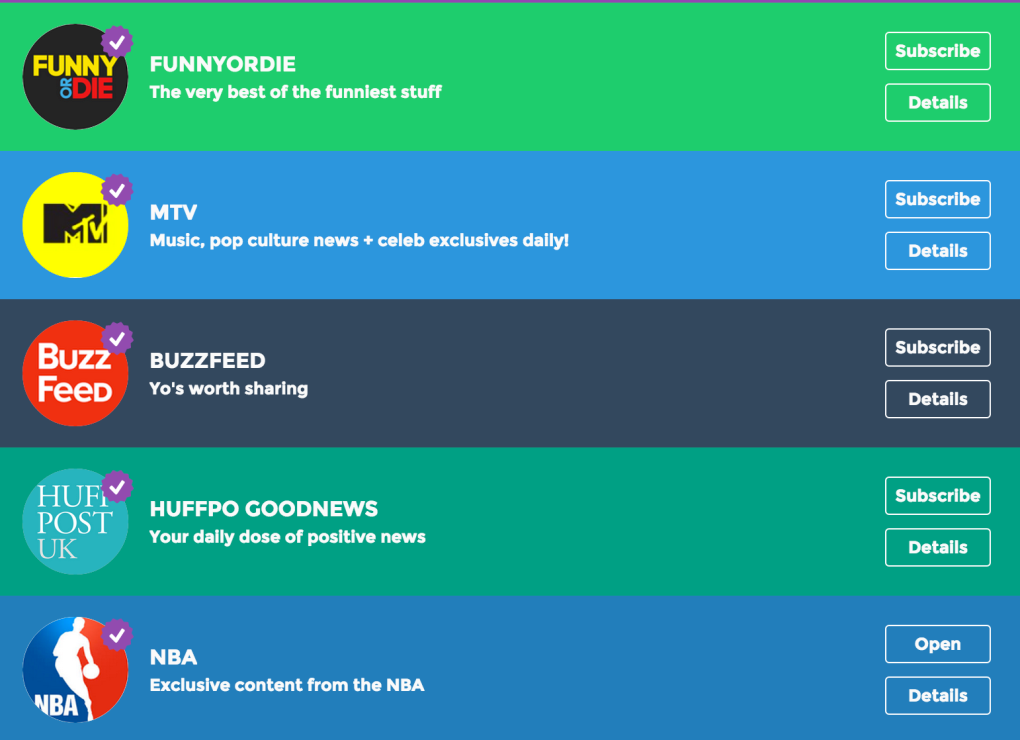
Read more on TechCrunch.
Facebook updates its Origami design prototype tool
Earlier this week, Facebook updated its Origami prototyping design tool in a way that lets users test their designs on iOS devices like the iPhone and iPad. The Origami tool lets users create user interfaces without having to create full applications. Facebook announced the news in a blog post, citing that it was the exact tool used to create interfaces for Instagram, Slingshot, and other stand-alone Facebook apps. With a placement on Github, a resource site for developers, Facebook also updated the entry for Origami, featuring additional tutorials to help users get started.
More information on Venture Beat.
Over 17,000 bugs submitted to Facebook in 2014
In 2014, an exact total of 17,011 bugs were submitted to Facebook, with 61 of them being considered severe, a jump of 16% in total bugs, and 49% for severe bugs. At Facebook, there is a bounty on bugs, with users being paid for identifying them and submitting them. A total of $1.3 million was paid out to users who identified the bugs, and the average price of a payment was $1,788. The Facebook Bug Bounty program has paid over over $3 million since its inception in 2011, according to Facebook security engineer Collin Greene. The largest amount of bugs identified by country were in India, with a total of 196.
More information on Social Times.
Twitter debuts official plugin for WordPress
Although Twitter plugins for WordPress have existed for years, this week marks the first time Twitter threw its hat in the ring with an official solution. The plugin, for WordPress version 4.1, serves to help users showcase Twitter content on their WordPress powered sites, and it comes with a number of customization options for embedding tweets and videos, including choosing the color theme, link color, and border color. Other options of the official plugin package include a Tweet button and a Follow button. Conversions for Twitter Advertising can also be tracked based on users who interact with Twitter content through the WordPress site.
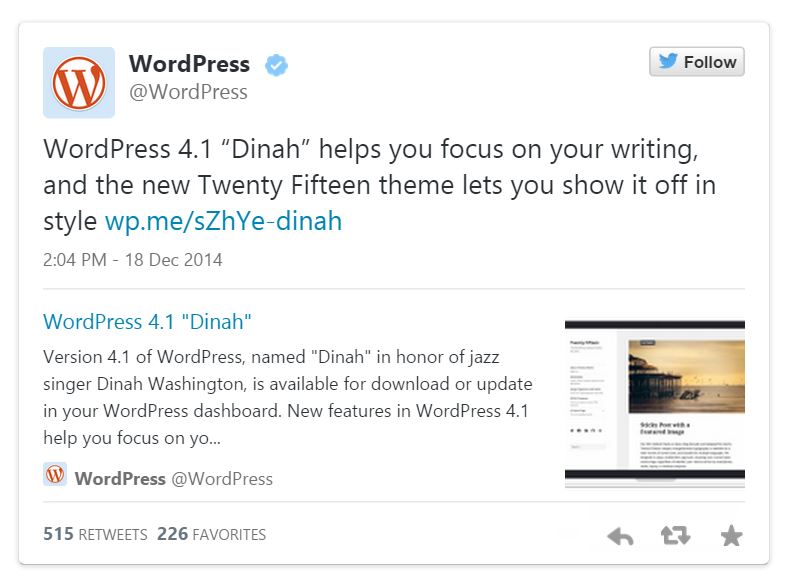
Read more on Twitter Blog.
Microsoft Outlook will no longer support GChat and Facebook Messenger
At the end of this past week, Microsoft issued a statement saying they would no longer be supporting Facebook Messenger and GChat, noting that they are ending the integration with Facebook, and that due to Google’s decision to discontinue the chat protocol used by Google Talk, that they can no longer support GChat. It is likely that Outlook users will continue to be encouraged to use Skype instant messaging for chat purposes, as the Microsoft owned service currently has an extremely large user base. Although Facebook chat functionality on Outlook will no longer be available, the larger integration with the social network will remain in tact, so that contacts on an Outlook account can still be synced with Facebook.
More information on Tech Times.
Twitter rolls out While You Were Away feature on Android
A new feature introduced back in January for the Twitter iOS app, While You Were Away has started rolling out for Android devices. The feature removes the well-known chronological order of tweets, and pushes specific content to the top of a user’s feed based on algorithms that decide what the user may be interested in, not completely unlike how Facebook serves content on the news feed. Frequent Twitter users will be served the updates less often, as they are likely to have kept up with what is going on with accounts they are following through the micro-blogging service.
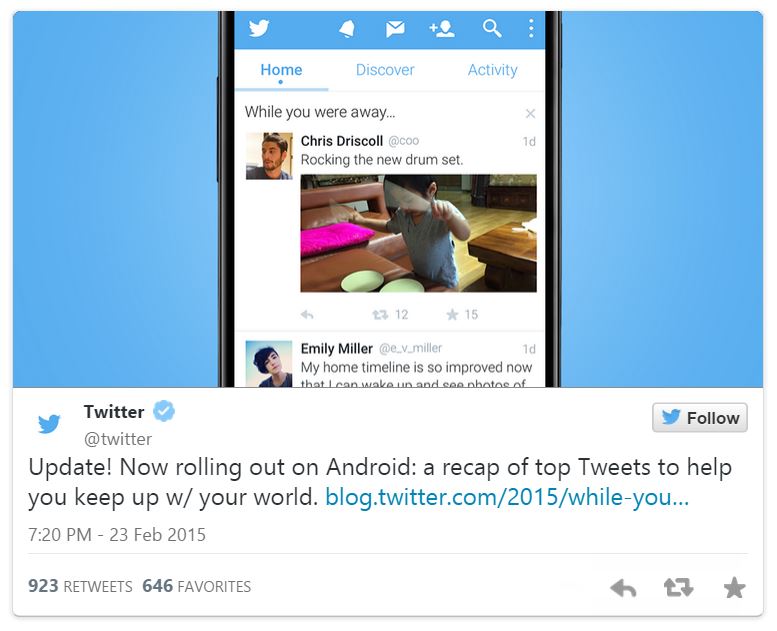
Read more on Mashable.
Native sharing now enabled for Facebook Messenger on iOS
With the new updated version of the Facebook Messenger app for iOS, there is now native support through the mobile operating system that lets users send content straight to the app. Users can send photos, videos, and links to their contacts directly from the share sheet that pops up when a piece of content is tapped for sharing. The feature must be enabled before it can be used, and can be swapped on the menu of native sharing apps for quicker access.
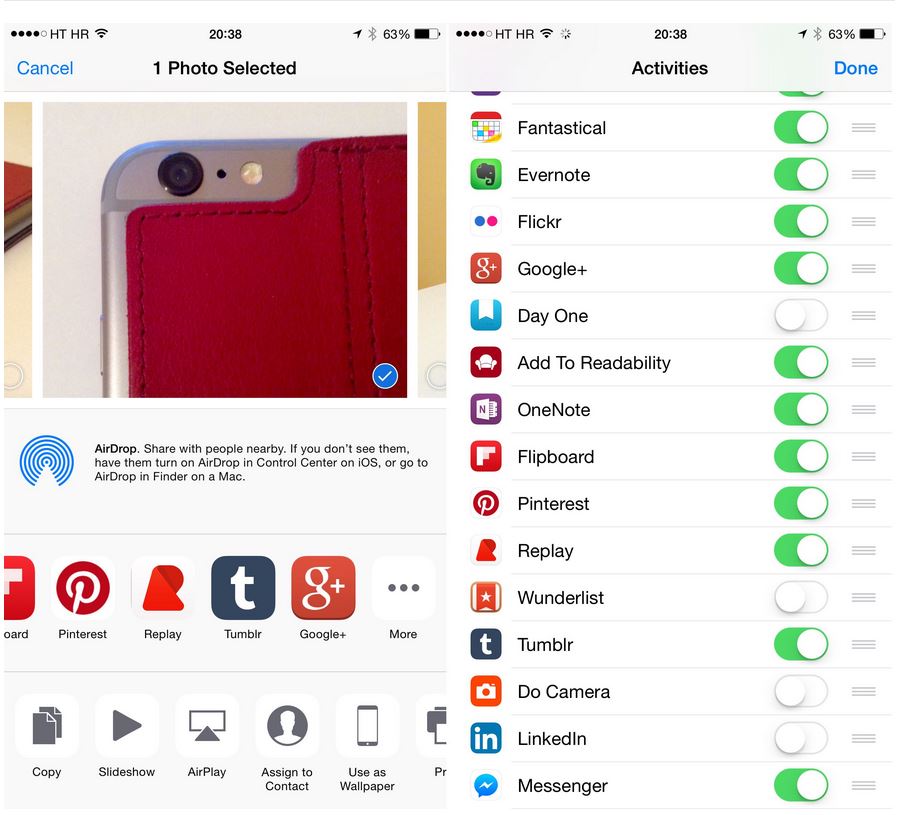
Read more on iDownloadBlog.
Facebook adds feature to help prevent suicides
Facebook has partnered with Now Matters Now, the National Suicide Prevention Lifeline, Save.org and Forefront: Innovations in Suicide Prevention, organizations aimed at the prevention of suicide to help users help others if they see content on the social network that may be a sign of impending suicide or self-harm. If a user sees a concerning post on their news feed, they can report the post, and a new option is get in touch with the friend, connect them to another friends, or connect them to a suicide prevention hotline. The service works on both mobile and desktop, and was announced this past Wednesday. Facebook will additionally review the reported post, and serve a notification to the user if they feel it indicates possible self-harm. Facebook has provided similar support since 2011, but this marks the first occasion of support being offered directly on the post-level.

Read more on Huffington Post.
Twitter updates features centered around user safety
Recently Twitter improved the ways users could report harassment on their service, and as a second step to this, they are improving the processes around reporting other content abuses, such as impersonation, self-harm, and sharing private information. According to a blog post from the company, these updates have started rolling out as of last week, and will continue in the coming weeks. Twitter explained that making these changes possible required significant work “behind the scenes”. Twitter has stated that the improved processes will also allow them to deal with reported content more efficiently, and deal with accounts that do not follow terms and conditions more easily.
More information on Twitter Blog.